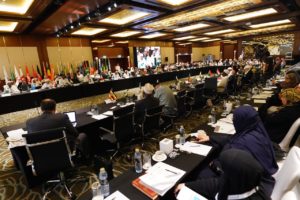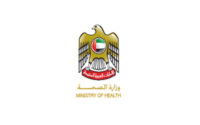The IIFA Conference Concludes In Dubai And Issues Resolutions And Recommendations
The International Islamic Fiqh Academy (IIFA) conference concluded its 24th session in Dubai under the patronage of His Highness Sheikh Mohammed bin Rashid Al Maktoum, Vice President and Prime Minister of the UAE and Ruler of Dubai. The conference was hosted by the Islamic Affairs and Charitable Activities Department in Dubai (IACAD), and issued a set of recommendations on important jurisprudential issues discussed during the three-day conference.
At the end of the conference’s sessions, the academy issued nine resolutions, each of which included recommendations on the topics raised. These included smart contracts and their relation with digital currency, inflation and change in currency value, FIDIC contracts, tolerance in Islam, achieving food and water security in Islamic countries, human genome and future biomedical engineering, hedging operations in financial institutions, the role of religious education in achieving peace, and cryptocurrencies.
With regards to smart contracts and its relation with the cryptocurrencies, the academy issued resolution no. 230 (1/24), which reaffirmed all the findings of the academy’s previous resolution on the Sharia provision of making contracts using new technologies. It also applies to electronic contracts, which are independent of smart contracts. The resolution explained the meaning of smart contracts and the way they are devised, while choosing to postpone its ruling on the matter pending a specialized seminar to further study the subject. Invitations will be extended to experts in technological fields such as Blockchain, and cryptocurrencies.
The academy’s resolution no. 231 (2/24) on inflation and change in currency value reaffirmed its previous resolution on low inflation. It left the estimation of excessive inflation to either mutual consent, judiciary or arbitration. The resolution ruled that in case of excessive inflation, following the start of a debt, there is no objection for the creditor and debtor to agree on paying the debt value or distribute the damage between both parties by mutual consent. The debt can also be fulfilled as per judiciary or arbitration ruling. However, it is not permissible to agree in advance on such terms. The academy reaffirmed its previous recommendation to all Islamic governments in its resolution no. (12/9/115) which included 12 points.
Regarding the FIDIC contracts, the academy’s resolution no. 232 (3/24) defined the concept of FIDIC contracts. It noted that these contracts are jurisprudentially permitted if they comply with Sharia provisions and regulations, as the case with the contract of Istisna’ and Ijarah (leasing), as well as contracts in which consent to change of the contract is altered at the time of its entry. In order to avoid dispute or conflict given the pre-agreement on the provision, by resorting to arbitration accepted by its parties, and because the financial increase that may occur on the agreed basis is not a reward for the delay in fulfilling, but rather compensation for damages that may be caused by one party to another, or because of changing implementation circumstances or its cost.
The academy’s resolution no. 233 (4/24) on tolerance in Islam, and its social and international ramifications reaffirmed the recommendations previously issued by the academy’s council, which calls for peaceful coexistence, further noting that tolerance is a principle that was elucidated in the Holy Quran and Sunnah, and that Muslims are ordered to be tolerant. The resolution noted the urgent need to work on the principle of tolerance, while praising international initiatives in this area, including the UAE’s efforts to promote tolerance and peaceful coexistence.
The resolution included several recommendations that called for the inclusion of the value of tolerance in educational curricula, religious discourse and the media. It also urged specialists and thought leaders to write about this subject and called on the United Nations to adopt legislation, which criminalize racism, exclusion and tribalism.
The academy’s resolution no. 234 (5/24) on food and water security discussed the meaning of both concepts and included six recommendations that stressed the need for governments of Islamic countries to put the issue at the forefront of their policies. It also stressed that Muslims should jurisprudentially avoid water and food waste, and that Muslim scholars must strive to find ways to help achieve food and water security. It also called on Islamic countries to bolster cooperation in order to address water and food shortage, and to use modern technology in seed production and enhancing agricultural yield. The recommendations highlighted that Islamic countries should take advantage of the Islamic Sharia to build agricultural resources by applying the principle of “reviving unused lands” with its Sharia regulations.
The Resolution no. 235 (24/6) on the human genome and future biomedical engineering emphasized the recommendation of the 21st session of the International Islamic Fiqh Academy conference. It is permitted to allow genome editing technology if approved by relevant medical authorities, and only if it is used for medical purposes, which prevent and cure genetic diseases. This requires strict regulatory procedures to ensure each person involved with the treatment is respected. The resolution clarified that it is not permitted from a Sharia point of view to transfer mitochondria with DNA from a healthy woman to another with mitochondria DNA damage that is intractable, in order to prevent genealogy.
Resolution no. 236 (7/24) on the role of religious education in promoting peace and caring of the Holy Quran and Sunnah, noted the importance of organizing regional and sub-regional conferences and seminars to enhance the role of religious education in achieving peace. The resolution also called upon the membered countries to form specialized committees to review their religious education curricula and ensure they promote peace, dialogue and coexistence. Additionally, the resolution stressed the importance of religious education to focus on God almighty honor for human, demonstrate concepts that promote tolerant values of Islam, and to publish further programs to teach the Arabic language, while adhering to the modern education system. The resolution also stressed the need to improve the education system and develop research centres in order to emphasize moderation and lead Muslims down the right path. The resolution also noted the need to promote peace and caring culture by teaching Fiqh Muqaran “Comparative Fiqh”, defend religious education and develop its curricula, as well as highlight the correct concepts about women in Islam.
Resolution no, 237 (8/24) deliberated cryptocurrencies, its methods, as well as the risks they pose. It also deliberated dealing with cryptocurrencies through online platforms or through brokers. The resolution highlighted that there were issues that emerged which would impact the Sharia provision. Therefore, and considering the risks cryptocurrencies pose, the board recommended further studies on the subject.
Resolution no. 238 (9/24) on hedging in Islamic financial institutions, mentioned the recommendations issued by the academic seminar conducted by the academy on this matter. The resolution reaffirmed the academy’s resolutions on hedging in financial transactions in its 23rd session. The resolution explained the general meaning of hedging transactions and their formats. It outlined in detail hedging transactions, which are prohibited by Sharia, their formats, and the reasons behind the prohibition. The resolution also explained Sharia provisions on alternative hedging instruments. It recommended all Sharia councils, Fatwa and Sharia supervisory bodies, as well as scholars and researchers to combine the purposes of Islamic Sharia and the partial Sharia regulations for contracts when they practice Ijtihad (independent reasoning) to structure Islamic financial products in general, and draft hedging contracts in particular. The resolution also recommended investment and treasury departments on institutional level and entities responsible for financial and monetary policies on a national level to attain a balance between debts and duties, and wealth to make sure they do not incur debt that affects the economy.
The full resolutions and recommendations of the IIFA Conference are available on the Islamic Affairs and Charitable Activities Department in Dubai (IACAD) website: www.iacad.gov.ae







